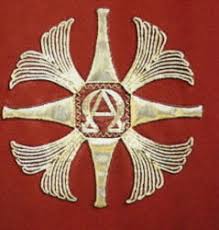Anonymous
07/06/2020 (Mon) 11:57:46
No.47258
del
"His consort was the goddess Sarpanit. He was also regarded as the son of Ea (Sumerian Enki) and Damkina, and the heir of Anu" "Babylonians were attacked by the Assyrians, who captured the statue of Marduk" and Assyrians have the same symbology..
"The deity of Marduk results in the Enûma Elish, which tells the story of Marduk's birth, heroic deeds and becoming the ruler of the gods. The purpose of this creation myth was to explain how Marduk came to power. This can be viewed as a form of Mesopotamian apologetics. Also included in this document are the fifty names of Marduk that represent everything Marduk symbolizes."
"In Enûma Elish, a civil war between the gods was growing to a climactic battle. The Anunnaki gods gathered together to find one god who could defeat the gods rising against them. Marduk, a very young god, answered the call and was promised the position of head god."
"To prepare for battle, he makes a bow, fletches arrows, grabs a mace, throws lightning before him, fills his body with flame, makes a net to encircle Tiamat within it, gathers the four winds so that no part of her could escape, creates seven nasty new winds such as the whirlwind and tornado, and raises up his mightiest weapon, the rain-flood. Then he sets out for battle, mounting his storm-chariot drawn by four horses with poison in their mouths. In his lips he holds a spell and in one hand he grasps a herb to counter poison.
First, he challenges the leader of the Anunnaki gods, the dragon of the primordial sea Tiamat, to single combat and defeats her by trapping her with his net, blowing her up with his winds, and piercing her belly with an arrow.
Then, he proceeds to defeat Kingu, who Tiamat put in charge of the army and wore the Tablets of Destiny on his breast, "wrested from him the Tablets of Destiny, wrongfully his", and assumed his new position. Under his reign, humans were created to bear the burdens of life so the gods could be at leisure; the lowly creatures built Marduk a temple called Ba-Bel ('Gate of God').
Marduk was depicted as a human, often with his symbol the snake-dragon which he had taken over from the god Tishpak. "
"The deity of Marduk results in the Enûma Elish, which tells the story of Marduk's birth, heroic deeds and becoming the ruler of the gods. The purpose of this creation myth was to explain how Marduk came to power. This can be viewed as a form of Mesopotamian apologetics. Also included in this document are the fifty names of Marduk that represent everything Marduk symbolizes."
"In Enûma Elish, a civil war between the gods was growing to a climactic battle. The Anunnaki gods gathered together to find one god who could defeat the gods rising against them. Marduk, a very young god, answered the call and was promised the position of head god."
"To prepare for battle, he makes a bow, fletches arrows, grabs a mace, throws lightning before him, fills his body with flame, makes a net to encircle Tiamat within it, gathers the four winds so that no part of her could escape, creates seven nasty new winds such as the whirlwind and tornado, and raises up his mightiest weapon, the rain-flood. Then he sets out for battle, mounting his storm-chariot drawn by four horses with poison in their mouths. In his lips he holds a spell and in one hand he grasps a herb to counter poison.
First, he challenges the leader of the Anunnaki gods, the dragon of the primordial sea Tiamat, to single combat and defeats her by trapping her with his net, blowing her up with his winds, and piercing her belly with an arrow.
Then, he proceeds to defeat Kingu, who Tiamat put in charge of the army and wore the Tablets of Destiny on his breast, "wrested from him the Tablets of Destiny, wrongfully his", and assumed his new position. Under his reign, humans were created to bear the burdens of life so the gods could be at leisure; the lowly creatures built Marduk a temple called Ba-Bel ('Gate of God').
Marduk was depicted as a human, often with his symbol the snake-dragon which he had taken over from the god Tishpak. "
